- Home
- Fergus Hume
The Mystery Queen Page 18
The Mystery Queen Read online
Page 18
“Oh, you go too far,” cried Mrs. Bolstreath, fanning herself with her handkerchief.
“Perhaps I do,” assented Dan, in a very dry tone; “but in a case like this it is just as well to take all necessary precautions. And in any case Curberry will haunt Lillian’s footsteps until she is out of the house, if only to find out why she paid this unnecessary visit.”
“He can ask her,” said the chaperon curtly.
“He won’t, if he is what I suspect him to be. But there, I may be accusing the man wrongfully.”
“I’m sure you are. Lord Curberry is a perfect gentleman.”
“Perfect gentlemen have been discovered doing shady things before now. However, you understand the comedy we have arranged. You have come to fetch Lillian back, and I came to escort you. Then get Curberry away on some pretext and let me have ten minutes talk with Lillian. Understand?”
“Yes,” gasped Mrs. Bolstreath; “but I don’t like these things.”
“One can’t touch pitch without being defiled,” quoted Dan, cynically, as they arrived at the open hall door; “we wish to see Lord Curberry.”
This last question was addressed to a footman, who came to meet them. He recognised Mrs. Bolstreath as having been in the house before with Miss Moon, so readily explained that the young lady was with his master in the drawing-room. Everything was so upset with the inquest, that he never thought of asking for a card, so conducted the visitors to where Lord Curberry was entertaining the girl. Having announced the names and fairly pushed them into the room, the footman departed in a hurry, as there was much excitement amongst the servants and he wished to hear all that was being said. Had not Curberry been attending to Lillian, he would have kept better order, as he was a severe master, and expected decency under all circumstances. But no doubt he also was disturbed by the unusual invasion of his house.
“My-dear-Lillian,” cried Mrs. Bolstreath, in large capitals, and advancing towards the end of the room, where Lillian was seated, looking uncomfortable, “my dear Lillian!” She glared at Lord Curberry.
The gentleman had evidently been pressing his suit, a proceeding which sufficiently explained Miss Moon’s discomfort. He was as cadaverous as ever in his looks, and his pale-blue eyes, thin lips and general sneering expression struck Dan afresh as uncommonly unpleasant. The man flushed to a brick red under Mrs. Bolstreath’s glare and hastened to excuse himself. “I am not to blame, I assure you,” he said, hurriedly.
“Blame!” echoes Lillian, with a thankful glance at the sight of her lover, “why do you say ‘blame’, Lord Curberry?”
“You ask that?” said Mrs. Bolstreath, plumping down indignantly, “when you go away without my knowledge to pay an unauthorised visit to a—a—a bachelor. If I thought that Lord Curberry—”
“I am not to blame,” said that gentleman again with a scowl, for he did not like to stand on the defensive.
“Of course you aren’t,” remarked Miss Moon, easily, and with another glance at Dan to point her words. “I saw in the paper that poor Mr. Penn was dead, and as he had been my dear father’s secretary I came on the impulse of the moment to learn exactly what had happened.”
Curberry nodded acquiescence. “I have explained the circumstance to Miss Moon and I shall explain matters to you, Mrs. Bolstreath! As for Mr. Halliday,” he frowned at Dan, “I don’t know why he has come.”
“To escort me, at my request,” said Mrs. Bolstreath, coldly. “It was necessary for me to call here, and take Lillian home. Why did you come?” she asked again.
“To hear about Mr. Penn,” repeated Lillian, rather crossly. “I have been telling you so for the last few minutes.”
“I am curious about Penn’s death myself,” said Dan, agreeably; “did he commit suicide?”
Curberry wheeled at the word. “Why should he commit suicide?” he demanded with suspicion written on every line of his clean-shaven face.
Dan shrugged his shoulder. “I’m sure I can’t say,” he answered good-humouredly; “only a man in good health isn’t found drowned unless he has some reason to get into the pond.”
“Penn was not in good health,” said Curberry, sharply; “he was always complaining and did his work so badly that I intended to give him notice.”
“Perhaps he committed suicide because you did.”
“No. I did not tell him to go, and, after all, I can’t say that he did kill himself. He was all right at luncheon yesterday, which was when I last set eyes on him. I went to town and returned at five o’clock to hear that he was dead. One of the servants walking in the park found his body in the ornamental water at the bottom of the garden.”
“Did anyone push him in?” asked Mrs. Bolstreath.
“I think not. He was on good terms with the servants, although not popular in any way. No one in my employment would have murdered him, and, as the gates were closed and no one called between luncheon and five o’clock yesterday, it is quite certain that he was not murdered by a stranger. In fact, I don’t believe he was murdered at all.”
“Suicide, then?” suggested Dan once more, and again Curberry looked at him unpleasantly, as if not relishing the idea.
“So far as I saw he had no intention of committing suicide,” he said in cold manner; “however, the evidence at the inquest will settle the matter.”
“I expect he didn’t look where he was going and fell in,” said Lillian suddenly. “Mr. Penn was always absent-minded you know.”
“I frequently found him so,” remarked Curberry grimly; “he made a great mess of his work occasionally. I am inclined to agree with you, Miss Moon.”
“Well,” said Dan, after a pause, “let us settle that Penn fell in by accident, until we hear the verdict of the jury. When does the inquest take place?”
“In another hour,” responded the host, glancing at his watch; “I was just impressing upon Miss Moon the necessity of returning home when you arrived. I have to be present, of course, so as to state what I know of Penn.”
“You will give him a good character?” asked Halliday, pointedly.
Curberry stared in a supercilious way. “The best of characters,” he said. “I had no fault to find with him save that he was absent-minded, a quality which no doubt accounts for his death, poor chap.”
“Well, well, it’s all very sad,” said Mrs. Bolstreath in a matter of fact way; “but all our talking will not bring the poor man back. Lillian, child, we must go home, now that your curiosity is satisfied. But first I shall ask Lord Curberry to give me some of those hot-house flowers I see yonder,” and she nodded towards a conservatory, which could be entered from the drawing-room by means of a French window.
“Oh, I shall be charmed,” said Curberry, with alacrity; “and perhaps Miss Moon will come also to choose the flowers.”
“I can wait here,” replied Lillian, carelessly. “I have every confidence in Mrs. Bolstreath’s choice.”
Curberry scowled at Dan, for he understood well enough that Lillian wished to remain with his rival. However, he could make no further objection without appearing rude, so he moved reluctantly towards the conservatory beside the chaperon. Yet Dan saw plainly that he was determined not to lose sight of the two, for he plucked the flowers which were directly in front of the French window, and thus could gain a view of the young couple every now and then, when facing round to speak with Mrs. Bolstreath. Lillian noticed this espionage, also, and whispered to Dan, who had sauntered across the room close to her elbow.
“He won’t let us out of his sight,” said Lillian, rapidly, “and I can’t get to the library, although I have been trying all the time.”
“Why do you wish to get to the library?” asked Dan, in a low voice.
Lillian rose suddenly and dropped a piece of paper. “Put your foot on it and pick it up when he is not looking,” she said, swiftly; “hush, he’s coming back,” and then she raised her voice as Curberry returned to the room. “Of course Mr. Penn was always nervous. I really think his health was bad.”
He took no notice of Dan, but offered his arm to Lillian. With a swift glance at her lover, at Mrs. Bolstreath, at the room, the flowers, at anything save Dan’s right foot, which was placed firmly on the scrap of paper, she accepted his offer. The chaperon followed, and when Curberry’s back was turned she noticed that Halliday stooped swiftly to pick up the paper. But that he gave her a warning glance she would have asked an indiscreet question. As it was, she went after her host and pupil, walking beside Dan, who had now slipped the paper into his trousers pocket. But Mrs. Bolstreath could not restrain her curiosity altogether.
“What is it?” she whispered, as they walked into the entrance hall.
“Nothing! Nothing!” he replied, softly. “take Lillian home at once. I shall follow later,” and with this Mrs. Bolstreath was obliged to be content, although she was desperately anxious to know more.
“I wish I could escort you home,” said Curberry, as the two ladies and he stood on the steps; “but my duty keeps me here for the inquest. Perhaps Mr. Halliday will oblige.”
“I am afraid not,” said Dan, stolidly. “I promised to meet my friend Mr. Laurance here. He is coming about the matter of Penn’s death. Why, there he is.” And sure enough, at a moment that could not have been better chosen, Freddy appeared advancing up the avenue.
“Well,” said Mrs. Bolstreath, catching a significant glance from Dan. “We are not able to wait and chat. Lord Curberry, we detain you.”
“No! no! Let me walk for some distance with you,” cried Curberry, and bareheaded as he was he strolled down the avenue between the two ladies. Laurance took off his hat and Lillian bowed graciously, as did Mrs. Bolstreath. But Lord Curberry took no notice of the reporter beyond a rude stare.
“That’s just as it should be,” remarked Halliday, watching the man’s retreating form, while Freddy came up to him; “you’re just the man we want.”
“We?” echoed Laurance, glancing round.
“Lillian and myself. See here, this is the note sent by Penn to her, and it asks her to do something which she has not been able to accomplish owing to our noble friend’s vigilance.”
“What’s that?”
“I’m just going to find out. I haven’t read the note as yet,” and with a second glance to make sure that Curberry was at a safe distance Dan opened the piece of paper, and read it hurriedly. A moment later he slipped it again into his pocket and took Freddy’s arm. “It’s only a few lines saying that Penn has left a document which he wishes Lillian to read. It is to be found between the pages of the second volume of Gibbon’s ‘Decline and Fall’. Hum! So that is why Lillian wished to get into the library.”
“Let me go,” said Freddy, eagerly.
“No! no! You catch Curberry as he returns and keep him in conversation on some plea or other. Then I can slip into the house and seek the library without being noticed.”
“Won’t the servants—”
“Oh, the house is all upset this day with the inquest, and everyone is wandering about more or less at large. I’ll chance it.”
“But if Lord Curberry asks for you?”
“Say that I am in the library and that I am waiting to have an interview.”
“On what subject?” asked Laurance, rather puzzled by this scheming.
“I’ll find the subject,” said Dan, retreating towards the door of the house; “all I want is five minutes in the library to find the confession. Detain Curberry for that time. Here he is coming back and here I am going forward.”
As he spoke Dan vanished into the house and came face to face with the butler. “I am waiting for Lord Curberry,” said Dan, “will you show me into the library, please.”
Suspecting nothing wrong and impressed by Dan’s cool manner, the butler conducted him to the room in question, and after intimating that he would tell his lordship, departed, closing the door. Halliday ran his eye round the shelves, which extended on three sides of the large compartment from floor to ceiling. It seemed impossible to find the book he was in search of, in so short space of time as would probably be at his disposal. He wished that Penn had indicated the position of Gibbon’s masterpiece. However, Halliday, by a stroke of luck, suddenly realised that Curberry numbered his shelves alphabetically, and catalogued his books so to speak by the initial letter of the author’s name. Those beginning with “A” were placed on the shelf ticketed with that letter, as Allison, Allen, Anderson, and so on, while the shelf “B” contained Browning, Bronte, Burns, and others. Going by this way of finding the whereabouts of books, Dan discovered Gibbon’s “Decline and Fall” on shelf “G” and laid his hand on the second volume. But as luck would have it, Lord Curberry suddenly entered the room just as he was about to open it. Halliday looked up, retaining the volume in his hand.
“I am rather surprised to see you here, Mr. Halliday,” said Curberry, in a cold and haughty tone, “you know that I am busy with this inquest and have no time for conversation. Besides,” he looked hard at his visitor, “you could have explained your business out of doors.”
“Not in the presence of the ladies,” said Dan promptly; “however, I won’t keep you more than five minutes,” and he wondered how he was to secure the confession without the knowledge of his host.
“I am waiting to hear what you have to say,” said Curberry, throwing his lean figure into a chair, “you have been making yourself at home,” he added, with a sneer, glancing at the book.
Dan laid it on the table. “I took up Gibbon’s second volume, just to pass the time,” said he carelessly, “I apologise if you think me presuming.”
“I don’t think anything,” rejoined Curberry, with a shrug, “except that I am anxious to know why you desire a private conversation.”
“It is about Lillian—”
“Miss Moon, if you please.”
“Lillian, to me, Lord Curberry.”
“Nothing of the sort, Sir,” cried the other suitor furiously, and his pale eyes grew angry. “Sir John Moon wishes me to marry his niece.”
“Probably, but his niece wishes to marry me.”
“That she shall never do.”
“Oh, I think so. And what I wish to say, Lord Curberry, is this—that you annoy Miss Moon with your attentions. They must cease.”
“How dare you; how dare you; how dare you!”
“Oh, I dare anything where Lillian is concerned,” retorted Halliday, and again in a careless manner took up the book, leaning against the table and crossing his legs as he did so.
“Leave my house,” cried Curberry, starting to his feet, for this nonchalant behaviour irritated him greatly.
“Oh, willingly! I simply stayed to warn you that Lillian must not be annoyed by you in any way.”
“And if I do not obey you?” sneered the other, quivering with rage.
“I shall make myself unpleasant, Lord Curberry.”
“Do you know to whom you are speaking?”
“Well,” said Dan, slowly, and with a keen glance at the angry face, “I am not quite sure. I am not Asmodeus to unroof houses, you know.”
Curberry’s yellow face suddenly became white, and his lips trembled nervously. “I don’t understand you.”
“I scarcely understand myself, and—”
“Wait,” interrupted Curberry, as a knock came to the door, “there is no need to let everyone overhear our conversation. Come in!” he cried aloud.
The butler entered. “You are wanted at the inquest, my lord,” he said, and as Curberry’s face was bent inquiringly on that of the servant, Dan seized the opportunity to slip a stiff sheaf of papers out of the Gibbon volume. As a matter of fact, it was three or four sheets joined at the corner by a brass clasp. Scarcely
had he got it in his hand when Curberry wheeled, after hurriedly telling the butler that he would come shortly.
“What have you there?” demanded the host, advancing menacingly.
“Some papers of mine,” said Dan, preparing to put the sheets into his pocket.
“It’s a lie. You must have taken them from the table, or out of that book, Mr. Halliday. Yes, I am sure you did. Give me what you have taken.”
“No,” said Dan, retreating before Curberry’s advance, “you are not to—”
Before he could get out another word, the man flung himself forward and made a snatch at the papers. Held loosely by the corner clasp they flew into a kind of fan, and Curberry managed to grasp one or two of the sheets. In the momentary struggle these were torn away, and then the owner of the house released himself suddenly. The next moment he had flung the sheets into the fire, apparently thinking he had got them all. Dan cleverly thrust the one or two remaining sheets into his pocket, and played the part of a man who has been robbed.
“How dare you destroy my papers,” he cried indignantly.
“They were mine,” said Curberry, gasping with relief, “and now they are burnt.”
“They were Penn’s,” retorted Halliday, sharply, “perhaps that is why they have been destroyed by you.”
“What do you mean; what do you mean?”
“Never mind. I think you understand.”
“I don’t. I swear I don’t.”
“In that case,” said Dan, slowly, “you can make public the fact that I came into your library to find a document in the second volume of Gibbon, which was placed there by Marcus Penn. But you won’t, Lord Curberry.”
“If the papers were not destroyed, I would place them before the Coroner at once,” said Curberry, wiping his face and with a glance at the fire on which fluttered a few black shreds—all that remained of what he had thrown in. “I think you must be mad to talk as you do.”
“If I am, why not make the matter public?” asked Dan, drily.

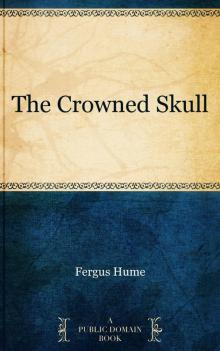 The Crowned Skull
The Crowned Skull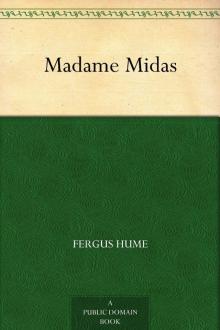 Madame Midas
Madame Midas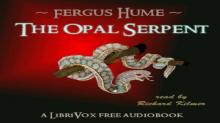 The Opal Serpent
The Opal Serpent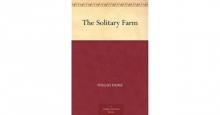 The Solitary Farm
The Solitary Farm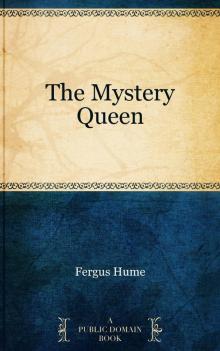 The Mystery Queen
The Mystery Queen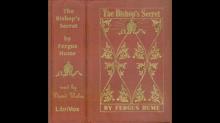 The Bishop's Secret
The Bishop's Secret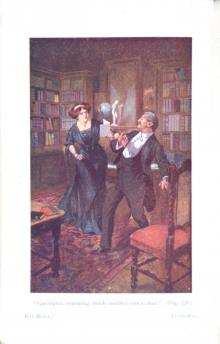 Red Money
Red Money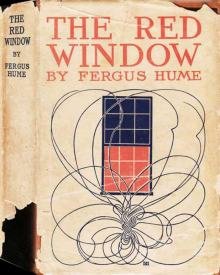 The Red Window
The Red Window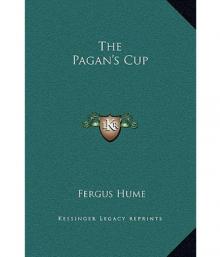 The Pagan's Cup
The Pagan's Cup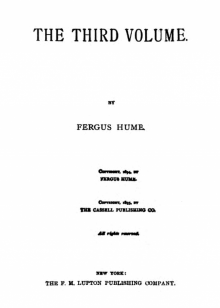 The Third Volume
The Third Volume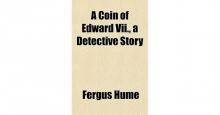 A Coin of Edward VII: A Detective Story
A Coin of Edward VII: A Detective Story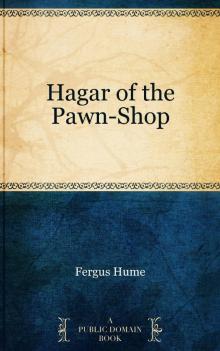 Hagar of the Pawn-Shop
Hagar of the Pawn-Shop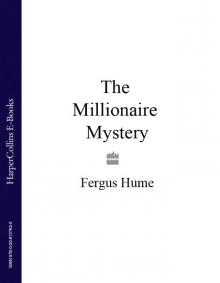 The Millionaire Mystery
The Millionaire Mystery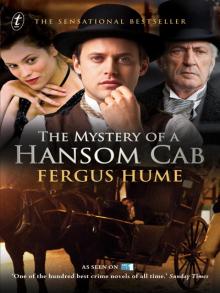 The Mystery of a Hansom Cab
The Mystery of a Hansom Cab